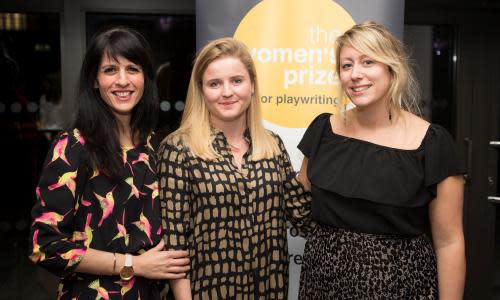Women's prize for playwriting longlist is 'politically charged', say producers

The longlisted writers for a new prize for female playwrights have created “satisfyingly puzzling” characters and “ambitious, politically charged” plays, say the award’s producers.
The Women’s prize for playwriting, open to writers in the UK and Ireland who identify as female, was launched last year. Submissions closed in early March and the prize has grown in significance in the wake of coronavirus, which led venues to close that month and has since devastated the theatre industry. Producer Ellie Keel, whose company launched the prize with Paines Plough (run by Charlotte Bennett and Katie Posner), warned that fewer creative risks will be taken by the industry after the pandemic. “It is a historically well-trodden path that work by women can be seen as risky,” said Keel, who wants to “force the theatre industry to rejuvenate rather than regress”.
For Keel, the prize is a galvanising movement as well as an award, intended to champion and nurture a community of female writers. She drew inspiration from the ongoing impact of the Women’s prize for fiction, first awarded in 1996, which was set up after the 1991 Booker prize shortlist included no female novelists. Keel said the Women’s prize for playwriting – in partnership with 45North and in association with Sonia Friedman Productions – is a “call to arms”, political in nature and aims “to redress the gender imbalance in the number of plays being produced on national stages”.
An archive of each year’s longlisted playwrights will be kept on the prize’s website as a resource for theatre programmers. Keel said that the subject matter of this year’s plays is hugely wide-ranging – “not remotely confined to ‘women’s issues’ or ‘domestic’ topics” – and that because they did not prescribe a particular space for plays to be written for, some are short and compact while others are sprawling epics. She believes the high number of entries (1,169) is down to the inclusive and encouraging framing of the entry criteria. “We understand the intimidating nature of submitting your work to a prize, especially early on in your writing career, and we welcomed plays at all stages of development and from writers from all backgrounds.”
The prize fund of £12,000 is a significant financial investment in one writer, which Keel hopes will enable a period of financial security in which to create more work. Some of the writers have made the longlist with their first play; others have already had acclaimed plays produced such as Isley Lynn, Yolanda Mercy, Miriam Battye, Camilla Whitehill, Julie Tsang and Eve Leigh. Writers were asked to submit scripts with a covering letter about themselves and the circumstances in which they wrote the play.
Earlier this year, research conducted by the playwright Jennifer Tuckett and the Sphinx theatre company suggested theatre’s gender gap had grown in key areas compared with eight years ago, when the Guardian conducted an in-depth study of the issue. Specific strategies have been adopted by some organisations to address the disparity. In 2019, artistic director Matthew Xia committed to commissioning only female playwrights for his first three years running Actors Touring Company. The National Theatre has set a target that by March 2021, 50% of living writers for its stages will be female and 50% of the directors working on its stages will be female.
Around half a dozen “finalist” plays will be selected from the longlist for the Women’s prize for playwriting and will go to a panel of judges chaired by literary agent Mel Kenyon. The winning play will be co-produced by Ellie Keel Productions and Paines Plough.
The oldest international prize for female playwrights is the Susan Smith Blackburn prize, which was set up in 1977 and awarded earlier this year to Lucy Prebble for her play A Very Expensive Poison.

